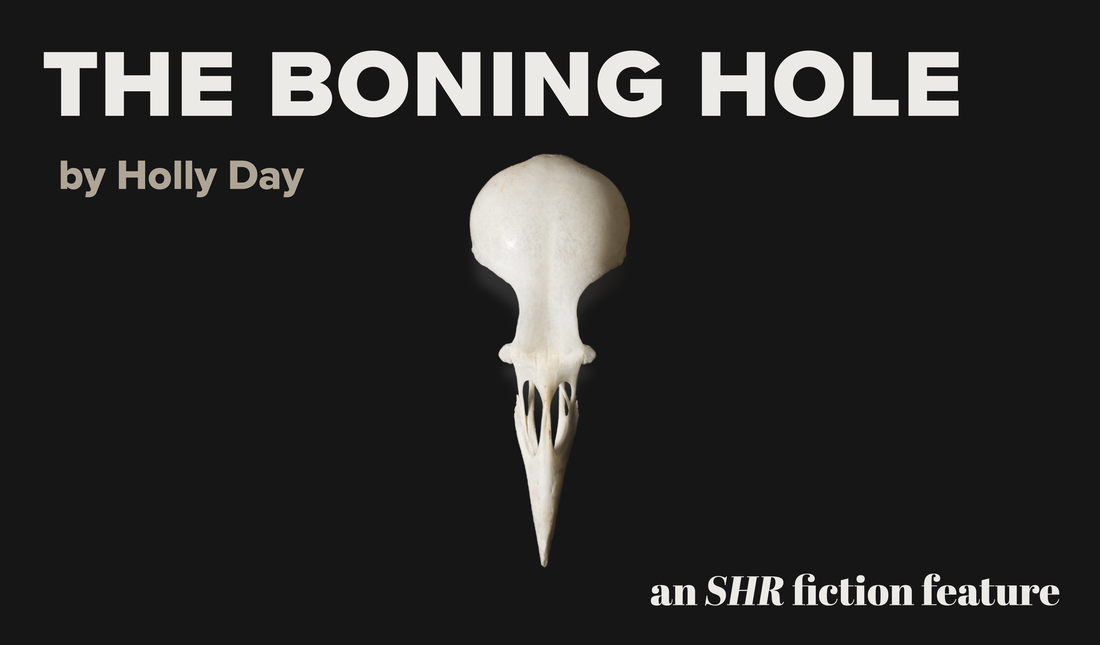There are a million reasons to excuse ripping them apart, still alive, to tease the malformed organs out onto the concrete of the pier, the dead-of-night air hollowing their screams into the panicked whispers of far-away sirens, alarm bells, chick peeps. An engorged heart stills to a twitch and then to nothing at your feet. A stomach, blueish gray and misshapen from the bits of hard plastic ingested and preserved, falls to the ground next.
The carcass is empty, and it’s not in here, either. Another man might have given up by now, but not you; no, sometimes you think you must be the most patient human being alive. You toss the still, damp body over the edge of the railing and wipe your bloodied hands off on your trousers. That’s the nice thing about the night, you reflect. At night, you can walk down a dark street covered in blood and nobody can tell, and even if they can tell, nobody says a word.
Below the pier, you can hear the angry scrabbling of wharf rats already laying claim to tonight’s kill. You pity those rats, having to eat such deformed, tainted stock, and wonder if one of them is the one you seek, the one that hides the thing you’re looking for. No one said it had to be in a bird.
Your welcome worn out, you head back to the beach, where the moon is shining both overhead and in the water. Your clothes seem to stink even more of the dead parts of the ocean when you’re around people slathered in coconut oil. You have to cut through the lobby of a nearby resort hotel to get to the nice part of the beach—luckily, there’s an FBI convention in town and no one has the nerve to stop you from trespassing just in case you’re undercover. It seems like there’s always an FBI convention in town. They have a lot of conventions. A shaky hotel clerk smiles at you as you cut a swathe of disgust through the guests milling about in the lobby. You nod importantly and act like you belong.
On the beach, a few people linger around the decomposing corpse of a sea lion that had washed up earlier, and you briefly think of checking the corpse for the thing you’re looking for but it’s too crowded outside to be rooting around in dead things, especially a dead thing this big. It’s not long before a sanitation truck pulls up and loads the body into the back of the cab, and if the thing you want was ever in there, it’s lost now. But perhaps what is in one body can be found in another.
Curiosity lures you to the site where the body was, an oily depression spotted with bits of sloughed-off flesh. You circle the dark spot, thinking, thinking, almost tripping over your own feet in your concentration. You stop and sit beside the spot, pretending to watch the children running into the breakwater further down the beach. Their shrill screams blend into the shrieks of the seagulls circling overhead. Your own childhood is a near-mystery to you, the memories blanked out by trauma. Or, perhaps, just plain irrelevance.
Post-dissection, you drop the body over the metal railing and into the black ocean below, hear it splash once before completely disappearing. Somewhere down there, you think, the battle over the mangled corpse has already begun, from the leopard sharks that can smell the fresh blood in the water from miles away to the tiny fish and crabs that are already there. By the time the tide carries the body to shore, most of the flesh will already be picked off, the bones and feathers gnawed free, the skull bald and riddled with tiny holes.
CURRENT ISSUE
|
CONTACT
|
DEPARTMENT OF ENGLISH
|


